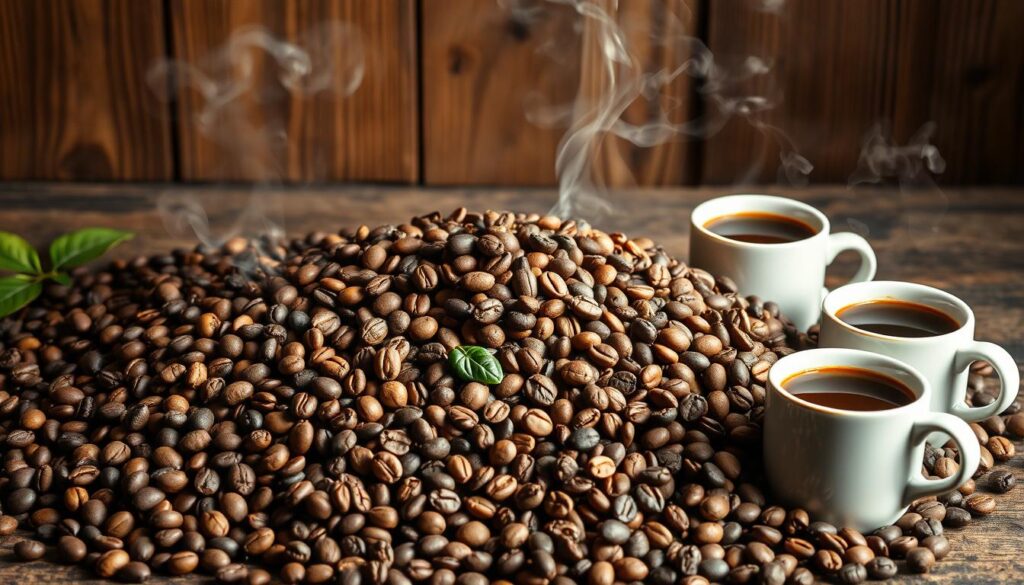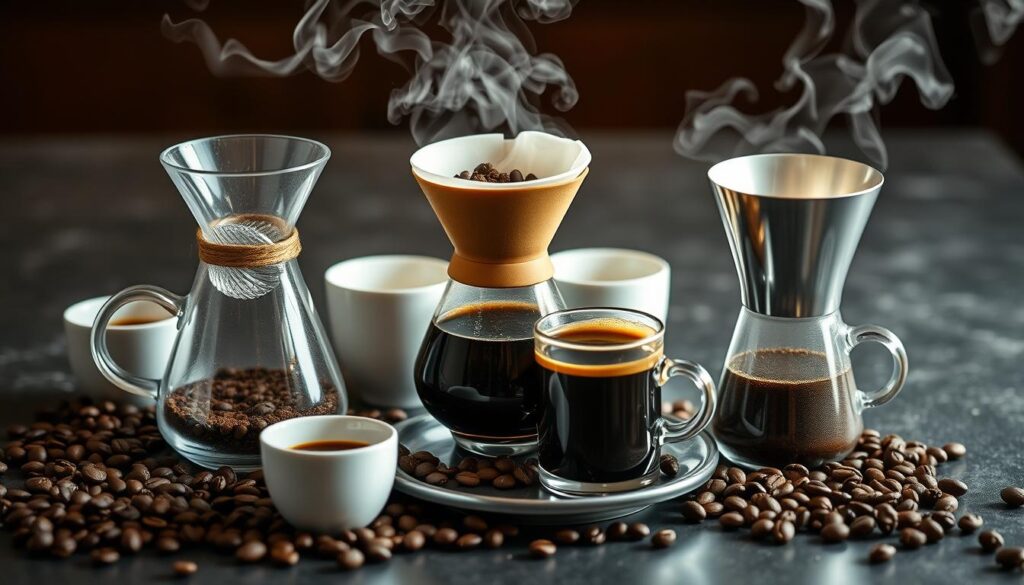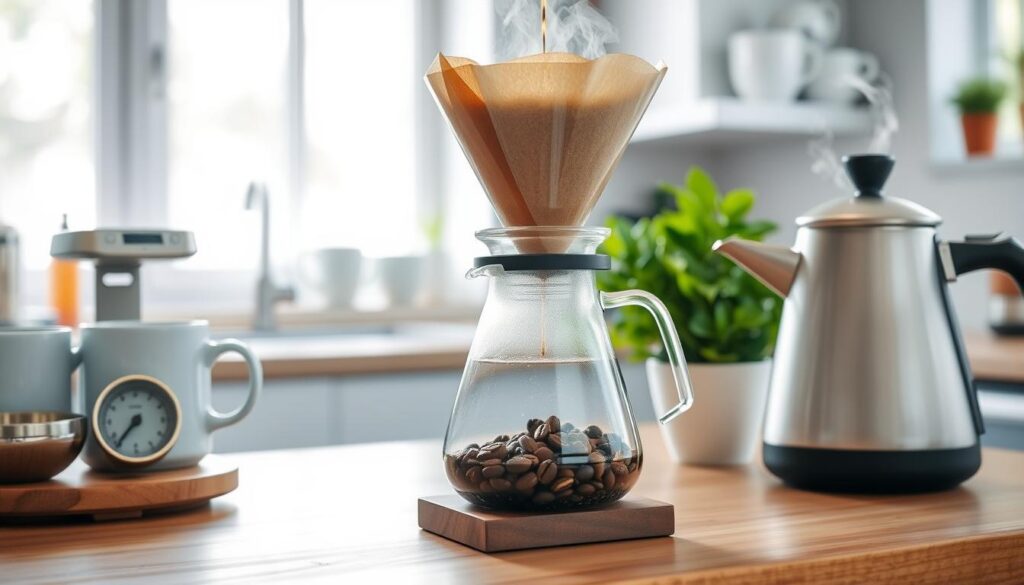Welcome to your journey of mastering coffee brewing! If you love coffee and want to brew the perfect cup, you’re in the right place. This guide will teach you everything about making great coffee at home. You’ll learn the importance of quality beans and the best brewing techniques.
We have expert tips for coffee lovers of all skills. Get ready to make your daily coffee amazing!
Table of Contents
ToggleKey Takeaways
- Discover the significance of high-quality coffee beans.
- Learn how to choose the right coffee grinder for your needs.
- Explore the different coffee roasts and their unique flavors.
- Master various brewing techniques to achieve the ideal taste.
- Avoid common mistakes that can ruin your coffee experience.
- Find out how to enhance your coffee experience at home.
The Importance of Quality Coffee Beans
Choosing the right coffee beans is key to a perfect cup. The quality influences the brew’s flavor and aroma. It’s important to understand where the coffee comes from. Ethiopian beans can taste fruity and floral. Colombian beans might be smooth with a balanced acidity. Brazilian beans often have a rich, nutty flavor.
Specialty coffees offer a better taste than commercial ones. They come from specific places, making them unique. The climate, soil, and how they’re grown affect their taste. Freshness matters too. Coffee loses flavor over time, so buy it fresh. Ethically sourced beans taste better and help farmers.
Here are some tips for picking coffee beans:
- Fresher is better: Buy small batches of freshly roasted beans.
- Know your origins: Explore different coffee origins to find your preferred flavor profile.
- Specialty quality: Look for beans labeled as specialty to ensure high quality.
- Ethical sourcing: Choose beans that support sustainable and fair trade practices.
Quality coffee beans make a big difference. They improve your coffee’s taste and your drinking experience.
How to Choose the Right Coffee Grinder
Choosing the right coffee grinder is key to the perfect brew. Different types of grinders affect grind size and flavor extraction. Knowing the burr vs blade grinders difference is crucial.
Burr grinders are a top choice among coffee lovers. They grind beans evenly with two revolving surfaces, providing a consistent size. This makes them great for various brewing methods. They are adjustable for a range from coarse for French press to fine for espresso.
In contrast, blade grinders chop beans unevenly. This results in different grind sizes, which can alter extraction and flavor. Though they are less expensive, they might not be the best for gourmet coffee enthusiasts.
Think about your brewing method when picking a grinder. A coarse grind is good for French press, while fine grind is best for espresso. Also, consider your budget. Burr grinders cost more but their consistency often makes them worth it. Take your time to explore your options and find the best grinder for you.
Understanding Coffee Roasts and Flavors
The world of coffee roasts is rich with various flavors and experiences. Delving into the differences among light, medium, and dark roasts can make your coffee drinking much more enjoyable. Each level of roast has its own flavor profiles, shaped by the roasting time and temperature.

A light roast shines with bright acidity and preserves the coffee bean’s natural flavors. It highlights the bean’s floral and fruity notes. This makes it a favorite for those who love a more subtle taste in their coffee. If you are looking for the best Website, you can visit here for more information: How to Make Tea Without Tea Bags
Light roasts are known for their:
- Higher acidity
- Fruity flavors
- Light body
On the other side, dark roasts bring out bold, rich flavors which can hide the original taste of the bean. They have less acidity but more body, showcasing notes of chocolate and nuts. People who prefer a strong cup of coffee might enjoy dark roasts. Features of a dark roast include:
- Low acidity
- Chocolate and caramel flavors
- Rich, full body
The Maillard reaction is a key part of roasting. This reaction happens when heat makes the sugars and amino acids in beans interact, creating complex flavors. Knowing how this process changes different coffee roasts helps you pick the right roast for your taste.
Think about what flavors you enjoy when choosing a roast. If you like a bright, varied taste, try a light roast. For those who love a deep, intense flavor, dark roasts are worth exploring. Experimenting with roasts or sticking to your favorite can make your coffee experience even more exciting.
How to Brew the Perfect Cup of Coffee
Brewing coffee at home is fun. Especially when you know how to do it right. There are many brewing techniques that coffee lovers enjoy. Each one brings out unique tastes and smells. Knowing these techniques and picking the right coffee makers will make your coffee better.
Common Brewing Techniques
Different brewing ways highlight different coffee features. This lets you try various flavors. Here are some favorite methods:
- Pour-over: You pour hot water over ground coffee in a filter. This method gives you good control over the extraction and flavor.
- French press: This method soaks coffee grounds in hot water. Then, you separate the grounds with a plunger. It makes a rich, strong brew.
- AeroPress: Many love this for its quick brew and rich taste. It uses pressure to extract the flavors.
- Espresso: This uses high pressure to get rich flavors. Espresso is the base for drinks like lattes and cappuccinos.
Recommended Coffee Makers
Choosing the right coffee maker improves your brewing. Here’s a table comparing popular makers and their features:
| Coffee Maker | Type | Capacity | Key Feature |
|---|---|---|---|
| Bonavita Connoisseur | Drip | 8 cups | Pre-infusion mode for better flavor |
| Hario V60 | Pour-over | 1-4 cups | Conical design for controlled pouring |
| Bodum Brazil | French Press | 8 cups | Classic design with a durable glass beaker |
| Breville Barista Express | Espresso | Single/double shot | Integrated grinder for fresh coffee |
Choosing the right brewing ways and coffee makers is key. They ensure your coffee is always amazing. Take time to try these methods. Enjoy your journey to the perfect cup of coffee.
Barista Tips for Coffee Preparation
To improve your coffee brewing, key barista tips are crucial. It’s all about the temperature of your water for starters. The sweet spot is between 195°F and 205°F. This range ensures the coffee grounds give out their best flavors.
Next, consider how long you brew your coffee. Different methods need different times. For instance, a French press should go for about four minutes. But espresso takes just 25 to 30 seconds. This helps avoid making your coffee bitter.
Keeping your equipment clean is also key for great coffee. Leftover oils and residues can ruin your brew’s taste. Clean your coffee maker, grinder, and tools regularly. This ensures your coffee tastes fresh every time.
- Properly measure coffee and water ratios to maintain balance; generally, a ratio of 1:15 for coffee to water works well.
- Experiment with grinding size; finer grinds work better for espresso, while coarser grinds are suitable for French press.
- Keep track of your water source—filtered water often yields better results compared to tap water.
Using these tips can make brewing coffee a fun ritual. It helps you enjoy a café-quality cup right at home.
Exploring Different Coffee Brewing Techniques
Stepping into advanced brewing techniques changes your coffee game. Each method unlocks unique flavors and textures. It’s an invitation to go beyond the usual coffee making.
Cold brew is a favorite for many. It’s made by steeping coarsely ground coffee in cold water for 12-24 hours. The result? A smooth, less acidic drink that’s perfect for warm days. Enjoy it over ice, or add a fizzy twist by carbonating it.
Siphon brewing offers a blend of science and art. A siphon puts hot water through coffee grounds using vapor pressure. It’s not just about the taste; the process is a spectacle. This method enhances the coffee’s nuanced flavors, delighting both the taste buds and eyes.
Nitro coffee is on the rise. It combines cold brew with nitrogen, creating a creamy treat. This method brings out the best in coffee’s flavors while cutting down on acidity.
Why try these methods? Let’s see:
- They improve flavor profiles.
- They offer unique textures.
- They add creativity to presentation.
Diving into cold brew and siphon brewing opens new doors. These techniques mix curiosity with the joy of finding new favorites.

| Brewing Method | Flavor Notes | Brewing Time | Acidity Level |
|---|---|---|---|
| Cold Brew | Smooth, Chocolatey | 12-24 hours | Low |
| Siphon Brewing | Complex, Fruity | 5-8 minutes | Varies |
| Nitro Coffee | Rich, Creamy | Varies | Low |
Enhancing Your Coffee Experience at Home
To truly enhance your coffee experience, consider incorporating certain coffee pairings into your routine. Pairing your favorite brew with delectable snacks can elevate flavors, introducing new dimensions to your tasting pleasure. Consider the following pairings:
- Dark Chocolate: Complements the richness of dark roasts.
- Cheese: Aged cheeses can balance the brightness of light roasts.
- Pastries: Flaky, buttery croissants work harmoniously with smooth coffee.
Creating a coffee tasting experience at home becomes a delightful ritual. Start by gathering different types of coffee beans. Prepare them using various methods.
Invite friends or family over for a tasting party. Feature several coffee pairings to explore. This will not only deepen your appreciation for different flavors but also builds a sense of community.
The right coffee accessories are essential for maximizing enjoyment. It’s wise to invest in quality items like:
| Accessory | Purpose |
|---|---|
| Digital Scale | Ensures accurate coffee grounds measurement for consistency. |
| Timer | Helps achieve the ideal brewing time for different methods. |
| Specialty Mugs | Enhances the aesthetic and sensory experience of coffee drinking. |
Engaging all your senses transforms your coffee routine into a special event. By exploring coffee pairings and using smart coffee accessories, you elevate your coffee experience at home. Find joy in every sip.
Common Mistakes to Avoid While Brewing Coffee
Brewing coffee might seem easy, but many make common coffee mistakes. Knowing these errors can really improve your coffee experience. Let’s look at some common issues:
- Using stale beans: Coffee beans become less fresh over time. It’s best to use beans that are freshly roasted and keep them well-stored to preserve their taste.
- Incorrect grind size: The size of the coffee grind impacts the brewing. Too fine, and you over-extract; too coarse, and you under-extract.
- Inadequate brewing time: Each brewing way has its own perfect brewing time. Too short, and your coffee is weak; too long, and it becomes bitter.
- Inappropriate water temperature: The wrong water temperature can ruin the taste. Aim for water between 195°F and 205°F for the best flavor.
To avoid these brewing errors, pay attention to each step in the process. Each factor affects your coffee’s quality. By refining your brewing skills, you’ll enjoy perfect coffee every single time.
Conclusion
Getting the perfect cup of coffee is a rewarding journey. It involves learning, skill, and a personal touch. By choosing the best coffee beans and the right grinder, you open up new flavors and joys. This journey shows that making great coffee is not just about the methods. It’s also about honoring what you like.
If you’re starting out or you already make coffee at home, keep exploring. New tips and tastes are out there, waiting to be found. Feel free to try new ways or tweak your routine to enjoy your coffee even more.
Take part in every step, share what you learn, and savor each drink. Your path to coffee excellence will boost your abilities and grow your love for coffee. Here’s to finding the best cup of coffee!
FAQ
How do I brew the perfect cup of coffee?
Start with high-quality, fresh coffee beans. Choose the right grind size for your brewing method. Fine grinds work well for espresso, while coarse is better for a French press.
Keep water temperatures between 195°F and 205°F. Watch your brew time closely. Try different coffee makers and methods to find what tastes best for you.
What are the best coffee brewing techniques?
Many people love French press, pour-over, AeroPress, and espresso methods. Each has a unique way of bringing out flavors. Pour-overs give you control over the extraction, and French press offers a full body.
Feel free to experiment with these methods to find your favorite one.
What is the difference between light roast and dark roast?
Light roast beans are roasted for less time. This gives them a brighter flavor with more acidity. Dark roast beans are cooked longer for a bolder taste and less acidity.
Which roast you prefer is all about your taste.
How can I choose the right coffee grinder?
Decide if you want a burr or blade grinder. Burr grinders are great for a consistent grind. Match your grind size to your brewing method; coarse for French press, fine for espresso.
Also, think about your budget and brewing habits when picking a grinder.
What are some common mistakes to avoid when brewing coffee?
Don’t use old beans or the wrong grind size. Incorrect water temperature and inaccurate measurements can ruin your coffee. Avoiding these errors can make your coffee taste much better.
How can I enhance my coffee experience at home?
Try pairing your coffee with foods like pastries or chocolate. Get accessories like scales, timers, and quality mugs. Focus on tasting and presentation to enjoy your coffee even more.
Are there advanced coffee brewing techniques worth trying?
Yes! Techniques like cold brew, siphon brewing, and nitro coffee can change your coffee experience. They bring out different flavors and textures not found in traditional coffee. Exploring these methods can add excitement to your coffee routine!













